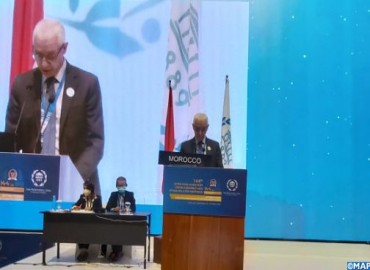
MOROCCO – March 22nd, 2012 – Rachid Talbi alami, speaker of the House of Representatives stated that Morocco was among the first to take proactive measures to reduce global warming gas emissions and protect the environment.
Talbi Alami, speaking at the opening of the 144th Assembly of the Inter-Parliamentary Union in Nusa Dua (Indonesia), under the central theme “Mobilizing Parliaments to Act on Climate Change”, stated that the protection of the environment is an integral component of the public policies of Morocco in accordance with the Constitution.
He said that environmental protection is achieved through various public policies. This includes the ambitious Kingdom policy in terms of energy production (solar, wind and hydraulic), and the agricultural policy, which contributes to the preservation and food security of Moroccans as well as the control of maritime fishing activities through strict monitoring and replenishment of fishery resource.
Tabli Alami also stressed the need to implement a comprehensive policy for the mobilization and prohibition of the production of non-biodegradable, as well as the prevention of the reuse of wastewater after treatment.
The speaker of the lower house said that the kingdom was committed to sharing its experiences and practices with sister African nations through flagship projects. He also mentioned that the AAA Initiative, which was launched in 2016 by His Majesty King Mohammed VI at the 22nd Conference of the Parties of the United Nations Convention on Climate Change in Marrakech, aims to address the challenge of Africa’s vulnerability to climate disruptions. He stated that it also aims to implement agricultural projects in a variety of African countries, which will contribute to poverty reduction.
The Kingdom of Morocco is committed to the preservation of the marine environment. This is in line with its policy and vision. He noted that the kingdom supports the drafting of and ratification of international conventions to protect international waters from pollution.
He said that the fundamental obstacle to the implementation of these conventions lies in the lack of commitment by governments and donor institutions to the matters discussed. Talbi Alami pointed out that there is also inadequacy in the funds pledged to finance alternative measures to those causing greenhouse gas emission, the lack of commitment by donor countries to a green, sustainable economic system, and insufficient sharing and cost of clean technology.
He stressed that the failure to honor Green climate Fund commitments – which are supposed to be replenished to the tune 100 billion dollars per year – is only one indicator of inadequacy of those promises.
He said that parliaments should keep pushing forward with their checks on the government mission’s work and legislative work to achieve these objectives. They are also expected to show leadership in matters relating the preservation of the environment through the use new technologies in data sharing as well as in the production from renewable sources of the energy they consume, he said.
He gave the House of Representatives’ example. The House has been following this path for the past few months, covering more that 50% of its annual energy needs from renewable sources and prioritizing digital data exchange, which has resulted an 80% decrease in its paper consumption.
It is a fact that all of us face the same fate when it comes to environmental risk. According to Talbi alami, the South’s environmental problems are worse than those of other countries. This is evident by droughts and desertification, deterioration and loss of forest cover, displacement of people and migration flows due to climate factors.
He highlighted that climate disruptions affect the most women, children, special needs people and small farmers.
These situations test the political will of international community and challenge the values we are supposed have in common,” Talbi Alami, who is leading a high level parliamentary delegation to IPU General Assembly 144th, the 209th session and related meetings in Bali (Indonesia) until March 24, said Talbi.
MAP 21 March 2022


